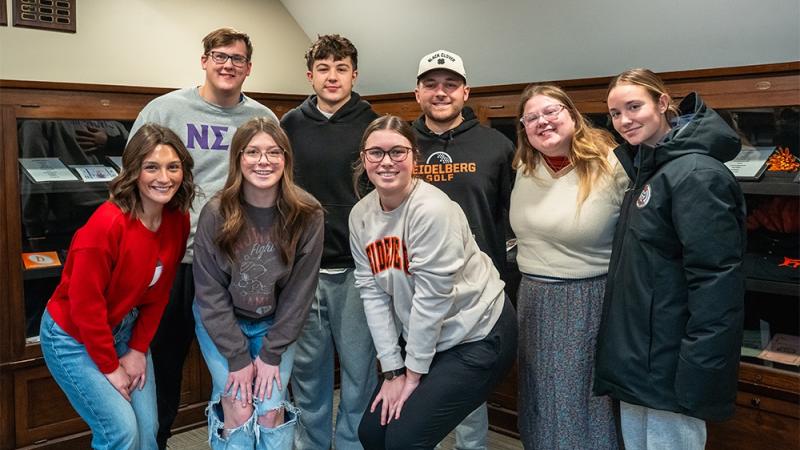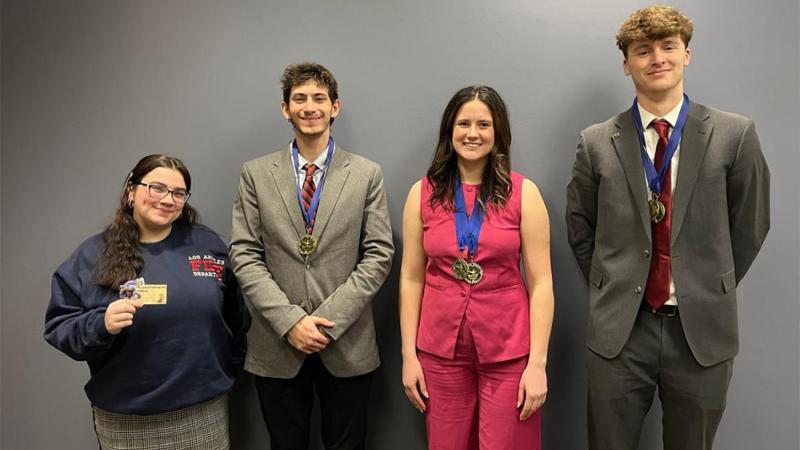Yusef Salaam of the Exonerated 5: “You’re here on purpose, for a purpose”
In a world where purpose is easily imprisoned by falsely assigned definitions, Dr. Yusef Salaam urges students and citizens of the world to live life to the fullest, with a focused understanding of self and an unalienable sense of purpose.
Dr. Salaam, a member of the Exonerated Five, was the fifth speaker for Heidelberg’s HYPE Career Ready® Program this school year. Dr. Salaam came to campus on a rainy February morning, and spoke to an eager crowd of undergraduate students, many of whom had watched the Ken Burns documentary about the injustice Dr. Salaam suffered, The Central Park Five (2012), the night prior. Dr. Salaam’s presentation was a unique blend of solemnity, mindfulness and humor that, combined, can only be attributed to a dutiful sense of honesty.
This honesty began as soon as Dr. Salaam was handed the microphone. After a few moments of considerate silence, he read a hateful letter sent to his family while he was in prison. In the letter, the writer threatened Dr. Salaam’s well being and wished him harm based on his conviction in the Central Park Jogger case. Dr. Salaam did not receive the letter personally until after his exoneration.
The Central Park Jogger Case
In 1989, Trisha Meili was going for a nighttime jog through Central Park in Manhattan. She was taken off of her path, raped and assaulted so violently that she was in a coma for 12 days after she was discovered. In spite of the severity of the assault, the police apprehended five teenagers, two 14-year-olds, two 15-year-olds and a 16-year-old.
One of the 15-year-olds was Yusef Salaam.
The teenagers were taken into custody. They had no legal counsel, no other adults present, and were lied to multiple times by the officers who interrogated them for many hours. Four of the five boys admitted to the crime after hours of aggressive interrogation tactics. Their accounts, obviously, did not match the reality of the crime scene, nor did their stories match each others’. Yusef Salam was the only one of the teens to not confess to the crime.
“My mother had come to find me,” Dr. Salaam recalled. His mother had insisted she was a lawyer for Dr. Salaam, and worked her way into the room. “She told me, and I’ll never forget it, ‘Stop talking to them. They need you to participate in whatever it is they’re trying to do. Do not participate. Refuse.’” In that moment, he realized the importance that his participation had on the system around him. He carried that knowledge with him when he was unjustly sentenced to prison.
“I was supposed to be transformed into a monster.”
Dr. Salaam, after reading the hateful letter sent to his family’s home when he was incarcerated, told Heidelberg students that he had “the amazing opportunity to go to prison.” He went on to describe the demands that life in prison put on a person. “Prison was a place where I was supposed to be transformed into a monster,” Dr. Salaam shared. In prison, Dr. Salaam was surrounded by the violence and rage that wasn’t consistent with who he was as a person.
“They were essentially trying to give me a definition,” Dr. Salaam described how it felt being sentenced. He notes that it was like society was telling him “this is not for you.”
Dr. Salaam shared a story about an interaction he had with a prison guard during his first few months in prison. He was shocked one day, because of the prevalence of the Central Park Jogger case in the media, when a guard asked him “Who are you?”
“I’m Yusef Salaam. I’m one of the people they convicted for the Central Park Jogger case, but I didn’t do it.”
“I know that,” the guard told him. “You’re not supposed to be here. Who are you?”
This interaction was enough to send Dr. Salaam on a quest of self-discovery. He began dissecting what his name meant, his identity, his goals and what his overarching purpose was. He found that the person in the mirror was raised to always get back up again. “When you fall, try to land on your back. Because if you look up, you can get up,” he told students. The person in the mirror wanted to encourage the caring people of the world, and make a difference for those hurt in the way he was. The person in the mirror defined himself, and made his own goals, and defended his own purpose. The man in the mirror was spiritual, loved poetry, and wanted a family; he took the steps required to share his spirituality, passion for poetry, and to start a family. “The creator said ‘be’ to me, and here I am.”
“You’re supposed to be here.”
Dr. Salaam’s story of injustice and identity did not come without some practical advice and encouragement to Heidelberg’s students.
“The challenge that we face is how do we use sacred time in order to project ourselves into our past while living in the present and having a clear vision for the future,” he said. “Our challenge, my challenge is, ‘How do we live full so we can die happy?’” Dr. Salaam shared what would become one of his mantras throughout his speech: “Know that you are here on purpose, for a purpose.” By knowing that students have a purpose in life, filling the blank canvas of who they are becomes more meaningful and intentional – people can become masterpieces on purpose, rather than accidental paintings.
The answer to the question, “How do you make it real?” is “Imagine what it would feel like.” According to Dr. Salaam, when you have that image in your head, you should “take a step back, ask yourself what did you do just before you made it? Then step back again, what did you do just before that?” By having that end goal in mind, and working backwards, you can create the map to getting to where you want to be and what you want to do. He took a moment to give the students a specific example: “Gift yourself permission right now to see yourself at your graduation. See it in all the fullness it could be.”
Finally, Dr. Salaam shared the truth of his experience as someone with a “complexion for rejection” in the United States. Through his work with the Innocence Project, which seeks to prevent wrongful convictions or executions, Dr. Salaam has met many people who were told that they were something evil, when they simply weren’t. He encouraged the students to refuse to be defined by others. Right before he was sentenced, back when he was a teenager, he shared some poetry that he had written with the jury and the judge. At the end of his speech here at Heidelberg, he shared it with the audience. His poem ends:
In our situation, they saw our faces clear,
But not mine, not because of fear.
It’s because the Black race was disgraced,
And for the Muslim, they must’ve felt shame,
But I’m not to blame with the words you bought.
The media took our words to paper, ones the cops distorted.
I told the cops truth like this and then boom.
They were smacking my man Korey Wise in the next room.
Now I know why the Rastas can’t stand the Babylon–
They never helped. They just babble on.
I used to think that people and cops were cool,
But who protects us from you?
I stand accused.




